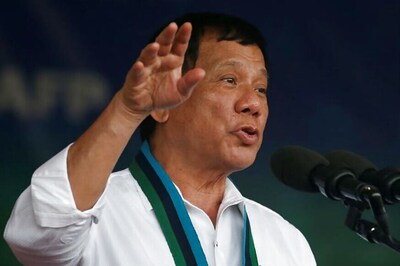
views
From peasant communities, to social activists to eminent historians, the coalition of the conscience that once rooted for the Left, are now ranged in implacable opposition against Buddha-babu. The West Bengal government's land acquisition in Singur and its plans of an SEZ in Nandigram have shocked the supporters of the CPM. How could a party committed to the poor and the marginalized, how could a party that initiated Operation Bargha, that so fundamentally empowered the rural poor, now turn against the very poor peasants who have voted for it year after year? Comrades within the CPM themselves are voicing dire warnings against neo-capitalism, the ayatollahs of the Delhi Politburo continue to issue their fatwas against foreign investment in India and party apparatchiks themselves are making critical films about Buddhadeb. The only thing that silences his critics is his mandate. In the assembly elections of 2006, with Brand Buddha and his new industrial policy very much on his campaign agenda, voters rewarded him with a gigantic three fourths majority, for the first time urban and affluent sections too voting for the Left.
Buddhadeb Bhattacharjee now finds himself cast in the role of agent of change, indeed an agent of metamorphosis. What is the best way to secure long term change and transform a certain type of Bengali psyche that revels in victimhood and forever sees itself in opposition to commerce, in opposition to reform and in opposition to progress? Economists have provided several solutions. First and foremost the land acquisition policy must be re-thought. Agriculture must first be liberalized. Economic liberalization is taking place in industry, but its not taking place in agriculture. If a villager wants to buy and sell land it is almost impossible. Converting agricultural land to non-agricultural land is in many cases illegal. Land is simply not an economic asset and whatever price the farmer sells his land at, he's going to be the loser. The liberalization of industry, as many economists are now saying, cannot take place, unless concomitant steps are taken to liberalise agriculture. And this means scrapping land ceiling laws, scrapping land conversion laws and regularizing land documents. If ceilings on industry can go, if a Tata or a Reliance can grow in an unlimited way, then why is agriculture still being kept tied to laws that prevent an agriculturalist from growing? If land is the only asset of the farmer, and this asset is going to cost five times more in the years then why will he sell at today's price? The struggle for land will continue to be violent and bloody unless the entire legal framework applied to agriculture is changed. Land must be bought from voluntary sellers and sellers will only sell voluntarily if they know they will be richer as a result. As economists point out, simply handing over compensation is not enough. Lump sums of cash are meaningless and are frittered away. Instead just as Buddhadeb is creating a metamorphosis in industry, he must equally create a metamorphosis in land, so the West Bengal peasant becomes the father of the industrialization process and not its step child.
Secondly, land acquisition methods too must change. Acquisition policies can incorporate the following: first leave homesteads intact, that is acquire the land but let the villages remain and avail of the new facilities that industry and the SEZ develops for them rather like the Lal Dora areas in Delhi. Second, lease land from the villagers instead of buying it outright so that the villagers become landlords instead of oustees and benefit from the rising rents of the land. Buddhadeb Bhattacharjee's industrial policy is certainly the only hope for West Bengal but the policy itself must be implemented in a manner that befits Buddha-babu. After all he is a reformer of the poor, not a reformer of the rich. His economic reforms are designed to rescue millions from poverty, not simply contribute to the coffers of industrial houses. There is another initiative that Buddha-babu must take as he embarks on the transformation of society and mentality in Bengal. Just as Rammohan Roy created a new progressive Bengali in the 19th century through an exciting fusion of Christian thought and Indian tradition, Buddhadeb Bhattacharjee has to create a new homegrown "leftism", a leftism of democratic market-friendly rootedness. How will he do this? Reformist chief ministers generally always lose the people's confidence. Chandrababu Naidu, SM Krishna and Om Prakash Chautala were all bundled out of office for daring to reform the economy.
Yet Buddhadeb has advantages that his other chief ministerial colleagues do not. In West Bengal, the CPM is a formidably well organized party machine, a system in which in every village almost everyone from the postman to the seamstress is loyal to an entity they call "the party". Now Buddhadeb should use this party machine to his advantage and push a "New Bengali" agenda. The chief minister should embark on a programme of mass contact, in almost Gandhian style. If the CPM becomes a regional rather than an ideological party, if it transforms itself (invisibly) into a Bengali DMK or Akali Dal, based on identity rather than ideology then Buddhadeb might find that he has far more room to manoeuvre, ideologically. In short for the economic agenda to succeed the chief minister must not sing `ekla chalo re'. Instead this is the time to ride out aggressively to meet the people, to encourage a range of new programmes and campaigns centred on the new Bengal and for using the party machine to embark on a whole new era of populism. Sops, subsidies and gifts to voters have never been the CPM's style. The cadres have ruled more by fear and intimidation than by generosity. But the time of economic reforms is also the time of generosity. It is a time for unleashing reforms across the board not just building flyovers and malls but in the agriculture market, in police stations, in cultural festivals, in the post offices and in the bureaucracy.
The unsmiling stern apparatchik must shed his stern-ness and stand forth as a large hearted leader of the people, a Bengali NTR or MGR, a popular hero, a subaltern who wants to make money for the sake of the village and not for the sake of the city, a towering personality who believes in pragmatism. Certain types of reformers are always popular in India, whether a Krishna Chaitanya or a Ramakrishna Parmahansa, the reformers of the poor. Reforms have to phrased in the language and idiom of the poor and not in the language of dry CII policy. Buddhadeb has the votes, he has the mandate, he has the party organization, he has the personal incorruptibility and now he has the historic moment. He has the opportunity to create a whole new language of economic reform. If he succeeds in doing this Buddhadeb Bhattacharjee will be the first and only chief minister to have created economic reforms in the name of the poor. And that will really be a metamorphosis. About the AuthorSagarika Ghose Sagarika Ghose has been a journalist for 20 years, starting her career with The Times of India, then moving to become part of the start-up team...Read Morefirst published:February 16, 2007, 09:28 ISTlast updated:February 16, 2007, 09:28 IST
window._taboola = window._taboola || [];_taboola.push({mode: 'thumbnails-mid-article',container: 'taboola-mid-article-thumbnails',placement: 'Mid Article Thumbnails',target_type: 'mix'});
let eventFire = false;
window.addEventListener('scroll', () => {
if (window.taboolaInt && !eventFire) {
setTimeout(() => {
ga('send', 'event', 'Mid Article Thumbnails', 'PV');
ga('set', 'dimension22', "Taboola Yes");
}, 4000);
eventFire = true;
}
});
window._taboola = window._taboola || [];_taboola.push({mode: 'thumbnails-a', container: 'taboola-below-article-thumbnails', placement: 'Below Article Thumbnails', target_type: 'mix' });Latest News
Franz Kafka's 'Metamorphosis' has haunted West Bengal chief minister Buddhadeb Bhattacharjee since his university days. There are many interpretations of the play, the most popular one, being how a salesman wakes up in bed one night to find himself transformed into "monstrous vermin" or a "bug" or an "insect." Buddhadeb Bhattacharjee does not need to worry about waking up in the morning and finding that he's become an insect. But perhaps he does needs to worry about a different kind of metamorphosis.
From peasant communities, to social activists to eminent historians, the coalition of the conscience that once rooted for the Left, are now ranged in implacable opposition against Buddha-babu. The West Bengal government's land acquisition in Singur and its plans of an SEZ in Nandigram have shocked the supporters of the CPM. How could a party committed to the poor and the marginalized, how could a party that initiated Operation Bargha, that so fundamentally empowered the rural poor, now turn against the very poor peasants who have voted for it year after year? Comrades within the CPM themselves are voicing dire warnings against neo-capitalism, the ayatollahs of the Delhi Politburo continue to issue their fatwas against foreign investment in India and party apparatchiks themselves are making critical films about Buddhadeb. The only thing that silences his critics is his mandate. In the assembly elections of 2006, with Brand Buddha and his new industrial policy very much on his campaign agenda, voters rewarded him with a gigantic three fourths majority, for the first time urban and affluent sections too voting for the Left.
Buddhadeb Bhattacharjee now finds himself cast in the role of agent of change, indeed an agent of metamorphosis. What is the best way to secure long term change and transform a certain type of Bengali psyche that revels in victimhood and forever sees itself in opposition to commerce, in opposition to reform and in opposition to progress? Economists have provided several solutions. First and foremost the land acquisition policy must be re-thought. Agriculture must first be liberalized. Economic liberalization is taking place in industry, but its not taking place in agriculture. If a villager wants to buy and sell land it is almost impossible. Converting agricultural land to non-agricultural land is in many cases illegal. Land is simply not an economic asset and whatever price the farmer sells his land at, he's going to be the loser. The liberalization of industry, as many economists are now saying, cannot take place, unless concomitant steps are taken to liberalise agriculture. And this means scrapping land ceiling laws, scrapping land conversion laws and regularizing land documents. If ceilings on industry can go, if a Tata or a Reliance can grow in an unlimited way, then why is agriculture still being kept tied to laws that prevent an agriculturalist from growing? If land is the only asset of the farmer, and this asset is going to cost five times more in the years then why will he sell at today's price? The struggle for land will continue to be violent and bloody unless the entire legal framework applied to agriculture is changed. Land must be bought from voluntary sellers and sellers will only sell voluntarily if they know they will be richer as a result. As economists point out, simply handing over compensation is not enough. Lump sums of cash are meaningless and are frittered away. Instead just as Buddhadeb is creating a metamorphosis in industry, he must equally create a metamorphosis in land, so the West Bengal peasant becomes the father of the industrialization process and not its step child.
Secondly, land acquisition methods too must change. Acquisition policies can incorporate the following: first leave homesteads intact, that is acquire the land but let the villages remain and avail of the new facilities that industry and the SEZ develops for them rather like the Lal Dora areas in Delhi. Second, lease land from the villagers instead of buying it outright so that the villagers become landlords instead of oustees and benefit from the rising rents of the land. Buddhadeb Bhattacharjee's industrial policy is certainly the only hope for West Bengal but the policy itself must be implemented in a manner that befits Buddha-babu. After all he is a reformer of the poor, not a reformer of the rich. His economic reforms are designed to rescue millions from poverty, not simply contribute to the coffers of industrial houses. There is another initiative that Buddha-babu must take as he embarks on the transformation of society and mentality in Bengal. Just as Rammohan Roy created a new progressive Bengali in the 19th century through an exciting fusion of Christian thought and Indian tradition, Buddhadeb Bhattacharjee has to create a new homegrown "leftism", a leftism of democratic market-friendly rootedness. How will he do this? Reformist chief ministers generally always lose the people's confidence. Chandrababu Naidu, SM Krishna and Om Prakash Chautala were all bundled out of office for daring to reform the economy.
Yet Buddhadeb has advantages that his other chief ministerial colleagues do not. In West Bengal, the CPM is a formidably well organized party machine, a system in which in every village almost everyone from the postman to the seamstress is loyal to an entity they call "the party". Now Buddhadeb should use this party machine to his advantage and push a "New Bengali" agenda. The chief minister should embark on a programme of mass contact, in almost Gandhian style. If the CPM becomes a regional rather than an ideological party, if it transforms itself (invisibly) into a Bengali DMK or Akali Dal, based on identity rather than ideology then Buddhadeb might find that he has far more room to manoeuvre, ideologically. In short for the economic agenda to succeed the chief minister must not sing `ekla chalo re'. Instead this is the time to ride out aggressively to meet the people, to encourage a range of new programmes and campaigns centred on the new Bengal and for using the party machine to embark on a whole new era of populism. Sops, subsidies and gifts to voters have never been the CPM's style. The cadres have ruled more by fear and intimidation than by generosity. But the time of economic reforms is also the time of generosity. It is a time for unleashing reforms across the board not just building flyovers and malls but in the agriculture market, in police stations, in cultural festivals, in the post offices and in the bureaucracy.
The unsmiling stern apparatchik must shed his stern-ness and stand forth as a large hearted leader of the people, a Bengali NTR or MGR, a popular hero, a subaltern who wants to make money for the sake of the village and not for the sake of the city, a towering personality who believes in pragmatism. Certain types of reformers are always popular in India, whether a Krishna Chaitanya or a Ramakrishna Parmahansa, the reformers of the poor. Reforms have to phrased in the language and idiom of the poor and not in the language of dry CII policy. Buddhadeb has the votes, he has the mandate, he has the party organization, he has the personal incorruptibility and now he has the historic moment. He has the opportunity to create a whole new language of economic reform. If he succeeds in doing this Buddhadeb Bhattacharjee will be the first and only chief minister to have created economic reforms in the name of the poor. And that will really be a metamorphosis.


















Comments
0 comment